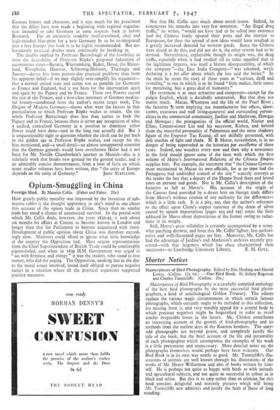Opium-Smuggling in China
Foreign Mud. By Maurice Collis. (Faber and Faber. 21s.) How greatly public morality was improved by the invention of sub- marine cables is the thought uppermost in one's mind as one closes this account of the opium trade in China. Since then no similar trade has stood a chance of uncensured survival. In the period with which Mr. .Collis deals, however, the years 1830-42, it took about six months for affairs at Canton to become known in London and longer than that for Parliament to become acquainted _with them. Development of public opinion about China was therefore exceed- ingly slow. Ministers could afford to ignore what little knowledge of the country the Opposition had. Most urgent representations from the Chief Superintendent of British Trade could be comfcirtably pigeon-holed, and when in 1839 H.M. Government was urged to "act with firmness and energy" it was the traders, who stood to lose money, who did the urging. The Opposition, awaking late in the day to the moral issues involved, found itself obliged to pursue negative tactics in a situation where all the practical arguments supported positive measures. Not that Mr. Collis says much about moral issues. Indeed, he compresses his remarks into very few sentences. "An illegal drug traffic," he writes, " would.not have had to be called into existence had the Chinese freely opened their ports and the interior to Europeans, for then the spread of new ideas would have resulted in a greatly increased demand for western goods. Since the Chinese were afraid to do this, and did not do it, the other system had to be devised. Nevertheless, explainable though its origin was, the drug traffic, especially when it had swelled till its value equalled that of the legitimate imports, was itself a blatant disreputability, of which the company "—the East India Company—" was ashamed, wryly declaring it a pis aller about which the less said the better." In the main he treats the story of these years as "curious, droll and revealing," as one in .which is to be found "little malice, little cause for moralising, but a great deal of humanity."
His treatment is at once attractive and competent—except for the pidgin English, which is decidedly amateurish. But that doe's not matter much. Macao, Whampoa and the life of the Pearl River ; the factories ea term implying not manufactories but offices, iihow- rooms, treasuries and staff living-quarters) and outstanding person- alities in the commercial community, Jardine and Matheson, Howqua and Mowqua ; the protagonists of the official world, Napier and Elliot, Commissioner Lin and his successor, Kishen, and behind them the masterful personality of Palmerston and the more shadowy figure of the Emperor Tao Kuang, all are skilfully presented, with deft touches of light and shade. H. B. Morse, nevertheless, is in no danger of being superseded as the historian par excellence of these years. Indeed, one wonders every now and then why a newcomer in the field should ignore some of the facts with which the first volume of Morse's International Relations of the Chinese Empire supplies him. For example, the statement that "the Chinese Govern- ment maintained in Macao its own officials, for at no time had the Portuguese had undivided control of the city" scarcely conveys to the reader the fact that a deputy of the Hoppo lived there and levied taxes on persons and goads. Nor is Mr. Collis's description of the factories as full as Morse's. His account of the origin of the Consoo fund provided by a direct levy on foreign trade differs from Morse's without citation of any authority for the difference— which is a little rash. It is a pity, too, that the author's reference to the effect upon China's copper currency of the drain of silver caused by opium importations (pages 103 and 195) omits the facts adduced by Morse about depreciation of the former owing to reduc- tions in its weight.
Still, Morse's great reliability is certainly accompanied by a some- what parching dryness, and from this Mr. Collis' lighter, less authori- tative and well-illustrated pages are free. Moreover, Mr. Collis has had the advantage of Jardine's and Matheson's archives recently pre- sented—with that largeness which has often characterised their
sucCessors—to Cambridge University Library. E. M. GULL.


































 Previous page
Previous page